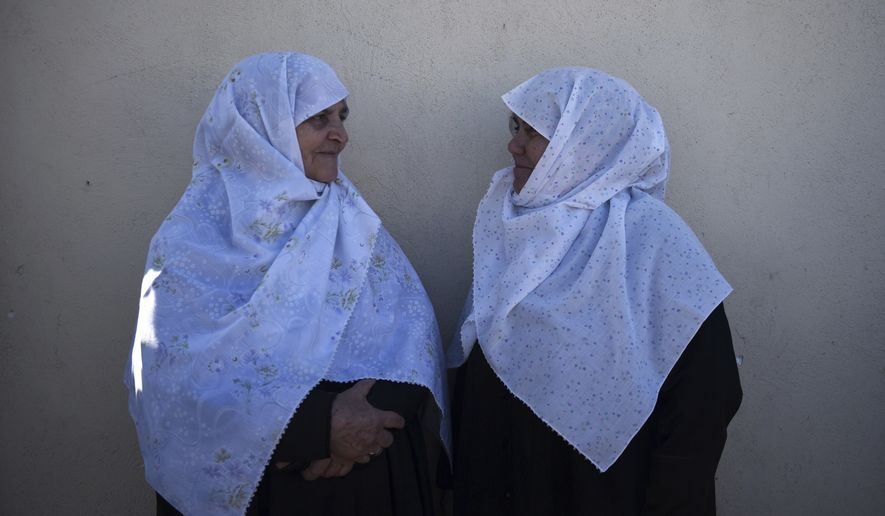ATHENS — Hatice Molla Sali will discover Wednesday whether she faces a life of poverty in her twilight years. That is when the European Court of Human Rights is expected to rule on the 68-year-old Muslim widow’s case against an Islamic court in Greece that deprived her inheritance from her husband under Islam-based Shariah law.
Mrs. Sali’s plight stems from a treaty Greece signed with the newly established Turkish republic in 1922. The two countries agreed to respect the legal systems of the respective religions of their largest minorities — Muslims in Greece and Orthodox Christians in Turkey.
Ironically, overwhelmingly Muslim Turkey banned Shariah law in 1923. But Greece still honors the treaty, making it the only country in Europe that recognizes Shariah today.
Early this year, the Greek government gave Muslim citizens an option about whether to appeal to Shariah or Greek public courts. But many of Greece’s 100,000 Muslims, mostly ethnic Turks concentrated along the Turkish border, still turn to Islamic religious judges in legal disputes.
The debate over the uneasy mix of religious and secular legal systems has echoed in the United States. At least seven states have either banned Shariah or barred courts from relying on foreign or faith-based legal precedents and practices.
Mrs. Sali has declined to speak to the press, but her attorney says her plight highlights a peculiar legal dilemma in a country considered to be the cradle of Western civilization.
“Two parallel systems can’t exist,” said Yannis Ktistakis, a lawyer who teaches international law at the Democritus University of Thrace. “Only the civil code can exist because Shariah is from its foundations opposite to European law.”
Mrs. Sali’s troubles started in 2008 when her sisters-in-law disputed her right to inherit her husband’s properties. The substantial estate includes shops and apartments in Thrace and Istanbul and proceeds from a successful textile business. The case went forward even though Mrs. Sali could produce her husband’s notarized last will and testament stipulating that she would be his sole heiress.
The sisters-in-law took the case to a Greek civil court, arguing that as Muslims they had the right to seek recourse with a mufti, an Islamic judge, under Shariah law. Greek lower courts decided in favor of Mrs. Sali, but the country’s Supreme Administrative Court reversed that decision, citing the 1922 treaty. A mufti, relying on Shariah law, then ruled that Mrs. Sali should receive only a fourth of her inheritance and that her sisters-in-law should have the rest.
“Her husband decided the way he wanted his inheritance to be passed on,” Mr. Ktistakis said. “The Greek court should have respected his desire.”
Personal fight
Some Muslims in Greece oppose Shariah law, saying it doesn’t reflect human rights that Europeans are entitled to enjoy.
For parliamentarian Mustafa Mustafa, a member of the left-leaning governing party Syriza, the fight against Shariah is personal.
When Mr. Mustafa’s father, Memet, died, the son wasn’t entitled to his parents’ inheritance under Shariah law because he was a minor at the time. Instead, the estate should have gone to his uncles and aunts.
But, Memet Mustafa’s legal guardian and great-grandfather — his grandparents had also died — made arrangements to make sure the son inherited his family’s wealth.
“My great-grandfather was a wise man,” Mr. Mustafa said. “He took my father, who was still a boy and transferred to him his part of the family property. I feel like I’m honoring my family by fighting to abolish Shariah.”
Under a law enacted this year, if one of the two Muslims in a Shariah legal dispute prefers a Greek civil court, then the case shall be tried in a civil court. But Mr. Mustafa still isn’t content.
“The progressive members of the minority want the definitive abolition of Shariah,” he said. “The state should have solved this problem decades ago. Nevertheless, we believe our small society will solve this problem on its own.”
For decades, Greek politicians upheld the treaty with Turkey to placate Muslim leaders who could deliver them votes. The arrangement also suited the goals of Greek nationalists.
“For a long time, it was in the interests of the Greek government to maintain Shariah for the Turkish-speaking minority because it emphasized their religious identity more than their ethnic and linguistic [Turkish] identity,” said Yuksel Sezgin, director of the Middle Eastern studies program at Syracuse University, who has studied Shariah law in Greece and around the world.
Even if the European Court ruled in Mrs. Sali’s favor, Mr. Sezgin said, he doesn’t think the Greek government should dispense altogether with Shariah law, which is applied relatively moderately. Instead, he recommended that the government discuss reforms with the Muslim community and codify and incorporate aspects of Shariah law in Greece. The laws aren’t written down, he said.
The Greek government also should put Muslim judges on Greek civil courts in regions where Muslims appear before the bench regularly.
“Even in Israel there are Muslim civil judges, while India has 7 percent Muslim judges,” he said.
But simply abolishing Shariah law will probably spark a backlash, he said.
“I’m not trying to defend Shariah, but if you abolish it unilaterally it will only radicalize certain elements in the region,” Mr. Sezgin said. “And although the community is so well integrated and there’s not one single case of a person going from Greece to Syria to join ISIS, under the current populist regimes, and without knowing how [Turkish President Recep Tayyip Erdogan] might react to it, it will be like setting off a time bomb.”




Please read our comment policy before commenting.